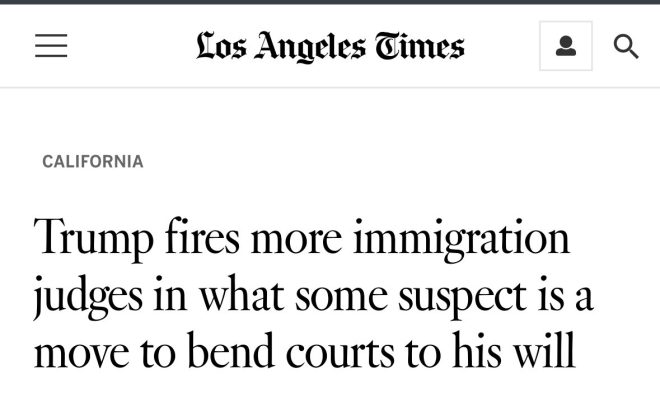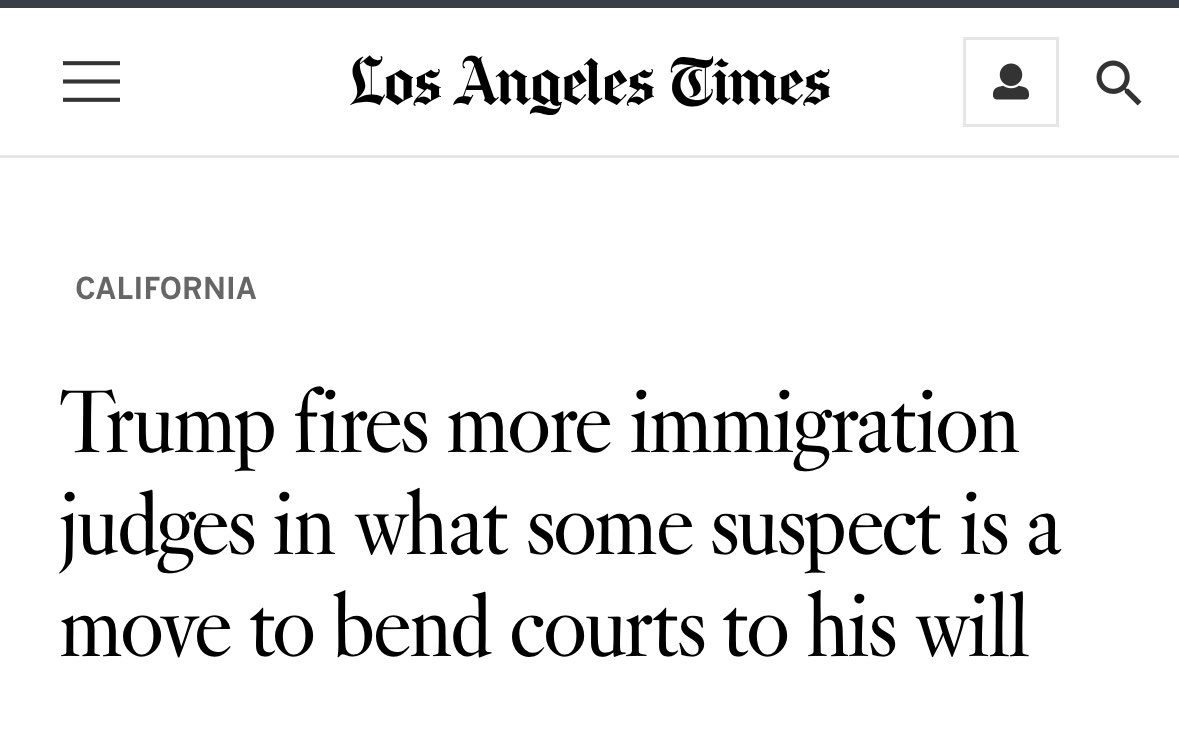
Trump Administration’s Impact on Immigration Judges
In a recent development, the trump administration has continued to make significant changes to the immigration court system by terminating the employment of eight immigration judges. This decision has raised concerns among legal experts and immigration advocates alike, particularly as one judge was reportedly fired in the midst of an asylum hearing, forcing them to leave the bench abruptly. The ongoing trend has resulted in nearly 50 fewer immigration judges since President Trump took office, leading to a backlog of cases and heightened scrutiny of immigration policies.
The Role of Immigration Judges
Immigration judges play a vital role in the U.S. legal system, hearing cases related to deportation, asylum petitions, and other immigration matters. These judges are responsible for ensuring that the rights of individuals are upheld while also enforcing immigration laws. The loss of judges in this already strained system exacerbates the challenges faced by many individuals seeking refuge or legal status in the United States.
Recent Firings and Their Implications
The recent firings of immigration judges have drawn widespread attention, particularly the incident where a judge was dismissed during an ongoing asylum hearing. This not only disrupts the judicial process but also raises questions about the fairness and integrity of immigration proceedings. Such actions reflect a concerning trend within the administration, where the independence of the judiciary appears to be compromised for political purposes.
The Backlog of Immigration Cases
The U.S. immigration court system has been struggling with a backlog of cases for years. The recent firings exacerbate this issue, as fewer judges mean longer wait times for hearings and decisions. With nearly 50 immigration judges removed from the system since President Trump took office, the backlog has only increased, leaving many individuals in limbo as they await the resolution of their cases.
- YOU MAY ALSO LIKE TO WATCH THIS TRENDING STORY ON YOUTUBE. Waverly Hills Hospital's Horror Story: The Most Haunted Room 502
The Impact on Asylum Seekers
Asylum seekers, in particular, bear the brunt of these changes. The process of seeking asylum in the U.S. is already fraught with challenges, including lengthy wait times for hearings and the psychological toll of uncertainty. With fewer judges available to hear these cases, many asylum seekers may face even longer delays, pushing them further into a precarious situation as they await a decision on their future.
Legal and Humanitarian Concerns
The firings of immigration judges raise significant legal and humanitarian concerns. Critics argue that the dismissals undermine the rule of law and threaten the rights of individuals seeking justice in immigration courts. The impact on vulnerable populations, including families fleeing violence and persecution, is particularly alarming. Many advocates fear that the lack of judicial oversight could lead to unjust outcomes in immigration cases.
The Broader Context of Immigration Policy
The firings of immigration judges must be viewed within the broader context of the Trump administration’s immigration policies. The administration has implemented a series of controversial measures aimed at curbing immigration, including travel bans and increased deportations. The dismissal of judges aligns with these policies, suggesting an effort to streamline the immigration process in a way that prioritizes enforcement over fairness.
The Future of Immigration Courts
As the situation continues to evolve, the future of immigration courts remains uncertain. The ongoing removal of judges raises important questions about the integrity of the judicial process and the administration’s commitment to upholding the rights of individuals seeking refuge in the U.S. Advocates and legal experts are calling for reforms to restore the independence of immigration judges and ensure that the court system can effectively handle the growing number of cases.
Conclusion
The Trump administration’s recent actions in firing immigration judges highlight significant challenges within the U.S. immigration system. With nearly 50 fewer judges and a growing backlog of cases, the implications for asylum seekers and others navigating the immigration process are profound. As the legal and humanitarian concerns mount, it is crucial for advocates, policymakers, and the public to engage in discussions about the future of immigration courts and the treatment of vulnerable populations seeking safety and justice in the United States.
By addressing these issues head-on, stakeholders can work towards a more equitable and just immigration system that respects the rule of law while upholding the rights of individuals seeking refuge.

Last week the Trump administration fired another 8 immigration judges. One judge was fired in the middle of an asylum hearing and had to walk off the bench before the hearing was over!
There are now nearly 50 FEWER immigration judges than when Trump took office! pic.twitter.com/WDj7AggRHT
— Aaron Reichlin-Melnick (@ReichlinMelnick) April 27, 2025
Last week the Trump administration fired another 8 immigration judges.
The ongoing saga of immigration policy in the United States continues to raise eyebrows, especially with recent developments that have left many people scratching their heads. Just last week, the Trump administration made another significant move by firing eight immigration judges. This abrupt decision has sparked conversations about the stability and effectiveness of the immigration court system. Imagine being in the middle of an asylum hearing, and suddenly, the judge is told to leave the bench. That’s exactly what happened to one judge, who had to walk off during an ongoing case. It’s a scene that feels almost surreal, doesn’t it?
The implications of these firings go beyond just the individuals involved. The number of immigration judges has drastically decreased, with nearly 50 fewer judges now than when Trump took office. This reduction raises questions about the ability of the immigration court system to handle the growing backlog of cases and ensure fair hearings for those seeking asylum.
One judge was fired in the middle of an asylum hearing and had to walk off the bench before the hearing was over!
The story of the judge fired in the middle of an asylum hearing encapsulates the chaos in the system. Not only does it highlight the abruptness of the decision, but it also showcases the human impact of such policies. For the asylum seekers, this situation can feel like a rollercoaster of emotions. You’re sitting there, hoping for a fair chance to present your case, and suddenly, the person who is supposed to listen to you is removed without warning. This can lead to confusion and frustration, not just for the judges but also for the individuals who are waiting for their day in court.
The firing of judges during active hearings raises concerns about the integrity of the immigration court system. How can we expect a fair process when judges are dismissed so carelessly? Many fear that this trend could lead to rushed decisions and a lack of thorough consideration for the cases at hand. In a system that is already overwhelmed, such actions can have dire consequences for the thousands of immigrants relying on these courts for justice.
There are now nearly 50 FEWER immigration judges than when Trump took office!
When we talk about the current state of immigration courts, the numbers tell a compelling story. The significant drop in judges is alarming. Nearly 50 judges fewer than when Trump took office means that the backlog of immigration cases continues to grow. The implications of this are far-reaching. Delays in hearings can lead to prolonged uncertainty for asylum seekers, many of whom are fleeing violence or persecution in their home countries.
The shortage of judges also puts immense pressure on the remaining judges. They now have to manage an overwhelming caseload, which can lead to hasty decisions that may not adequately consider the nuances of each case. It’s a troubling cycle that seems to perpetuate itself, as the lack of judges can create a backlog, which in turn leads to further frustrations and complications in the system.
This situation isn’t just a statistic; it’s about real people. For countless families, the outcome of their immigration hearings can determine their future in the United States. The stress of waiting for a hearing can be unbearable, especially when the stakes are so high. With fewer judges, the system is inevitably strained, and the ripple effects are felt by everyone involved.
What Does This Mean for Asylum Seekers?
So, what does all of this mean for those seeking asylum? The landscape is more daunting than ever. With fewer judges to hear cases, asylum seekers face longer waiting times and increased uncertainty. This can lead to heightened anxiety and stress for individuals and families who are already in vulnerable situations.
Imagine being someone who has fled your home in search of safety, only to be met with an immigration system that feels like it’s working against you. The psychological toll this takes can be significant. Many asylum seekers are already dealing with trauma from their experiences, and adding prolonged uncertainty about their future can exacerbate mental health issues.
Moreover, the lack of judges can lead to inconsistencies in how cases are handled. With fewer eyes on the cases, there’s a risk that some individuals may not receive the fair hearing they deserve. This could lead to unjust outcomes where people are denied asylum without their cases being fully considered. The ramifications of this are profound, affecting not just the individuals involved but also the broader fabric of society.
The Bigger Picture: Immigration Policy in the U.S.
The firings of immigration judges are just one piece of the larger puzzle that is U.S. immigration policy. This event highlights the ongoing tension between immigration enforcement and the rights of those seeking refuge. It raises critical questions about how the U.S. prioritizes its immigration system and whether it is truly committed to providing fair and humane treatment to those who come seeking asylum.
As the political landscape continues to shift, it’s essential to stay informed about how these changes impact individuals and families. The immigration court system is a vital component of the broader immigration framework, and understanding its intricacies can help shed light on the challenges faced by those navigating it.
Furthermore, discussions about immigration policy often evoke strong emotions and opinions. It’s crucial to approach these conversations with empathy and a willingness to listen to the experiences of those affected by these policies. The people behind the headlines are not just statistics; they are individuals with stories, hopes, and dreams.
How Can We Advocate for Change?
Advocacy plays a significant role in shaping immigration policy and ensuring that the voices of asylum seekers are heard. It’s essential to support organizations that work tirelessly to provide legal assistance and resources to those in need. Whether through donations, volunteering, or spreading awareness, every action counts.
Engaging in discussions about immigration policy within your community can also help foster understanding and empathy. By sharing information and stories, we can humanize the issue and encourage others to see the individuals behind the statistics. It’s about creating a culture of compassion and support for those who are seeking a better life.
In addition, staying informed about policy changes and their implications is crucial. By understanding the nuances of immigration law and the challenges faced by the immigration court system, we can advocate more effectively for reforms that prioritize fairness and justice.
In summary, the recent firings of immigration judges highlight the ongoing challenges within the U.S. immigration system. As the number of judges dwindles, the effects ripple through the lives of countless asylum seekers. By remaining informed and engaged, we can work towards a more equitable immigration system that honors the rights and dignity of all individuals seeking refuge.
